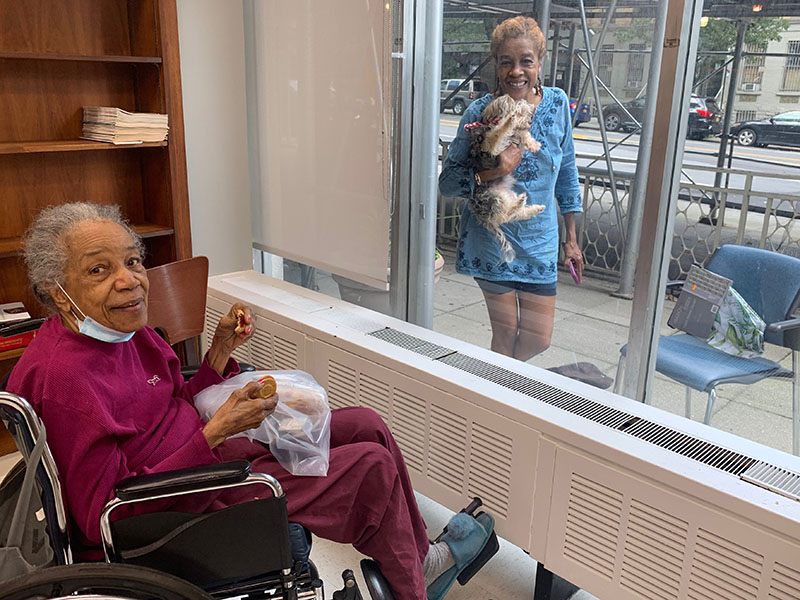Reuniting Families, at a Safe Distance
One day in early July, Peter and Susan Day drove to Sarah Neuman, The New Jewish Home’s Westchester campus, to visit Peter’s mother, Virginia. It was a trip they’ve made many times before, but this time it was different: they hadn’t seen her in person in months, and she had been very ill with COVID-19. Though they had video and phone chats with Virginia since she’s recovered, it was hard not to see her in person.
Virginia, 96, a resident at Sarah Neuman for about four years, originally moved there with her husband, who passed away about a year ago. “Seeing her live was amazing,” Susan said. “We came in two cars because my kids wanted to see her, too. We were even able to bring her favorite snacks. We pulled both cars up, and they parked her between us. To be able to see her smile and laugh—we really enjoyed it, it meant a lot to us. Everyone at Sarah Neuman is wonderful, we love them all. They’re so good with her, and so good at keeping us informed.”
While The New Jewish Home is not yet permitted by the New York State Department of Health to welcome visitors back at its Westchester and Manhattan facilities, the therapeutic recreation teams are working hard to give residents and their families opportunities to see each other. Sarah Neuman staff has been facilitating curbside drive-by visits, while staff in Manhattan has been helping families arrange contactless visits through a large ground-floor window near the front entrance. Families and residents alike are overwhelmingly happy to see each other after being separated for the past four months.
The curbside visits at Sarah Neuman began on July 1, and within just a couple of days, 20 residents had received visits from their families. Barbara Caggiano has already made two visits to see her mother, Rose, who is 94. She brought along her father, also 94. Until Rose became ill last winter, the two lived together independently, and being separated has been difficult. Rose had been hospitalized with an infection, and at the hospital she contracted a mild case of COVID-19. Rose was then discharged to Sarah Neuman for rehabilitation.
Visiting Rose “was such a nice experience,” Barbara said. “The staff were very responsive and helpful. They had set up tables with umbrellas, and brought my mom, who was wearing a mask, there in her wheelchair. We sat in the car and we were able to speak to her. Even though we were more than six feet away, it was very pleasant. I can’t say enough good things about the staff, they did a really good job.”
Althea Blache has been at The New Jewish Home’s Manhattan skilled nursing facility since Christmas, and her daughter Addie used to visit every day. Althea, 92, has dementia and is hard of hearing, so their FaceTime calls, while reassuring for Addie, have been confusing for Althea. Addie knew that her mother was safe and well cared for, but worried that she felt abandoned. Addie was thrilled that she could set up a visit at the street-side window on West 106th St. “It relieved me to get to see her,” she said, “ but it made a bigger impact on her, because she was actually able to see me close up and see her puppy!” Next, to celebrate some family birthdays, Addie’s planning another visit and is figuring out a way to include cake—her mother loves sweets.
Until the nursing homes are able to reopen their doors to family members, curbside and window visits are a safe way for residents and their families to reunite after a long separation.
The New Jewish Home has a proud legacy of empowering older adults to live with purpose and enhanced well-being. We’ve been around since 1848 as one of the nation’s first nursing homes, and now serving older New Yorkers of all backgrounds through a portfolio of health care services, including post-acute care and rehabilitation, skilled nursing, adult day care, assisted living, and at-home care.
See how we continue to elevate health care for older adults through our Research Institute on Aging and our SkillSpring program (formerly known as Geriatrics Career Development program), which empower teens and young adults to begin careers in health care.

